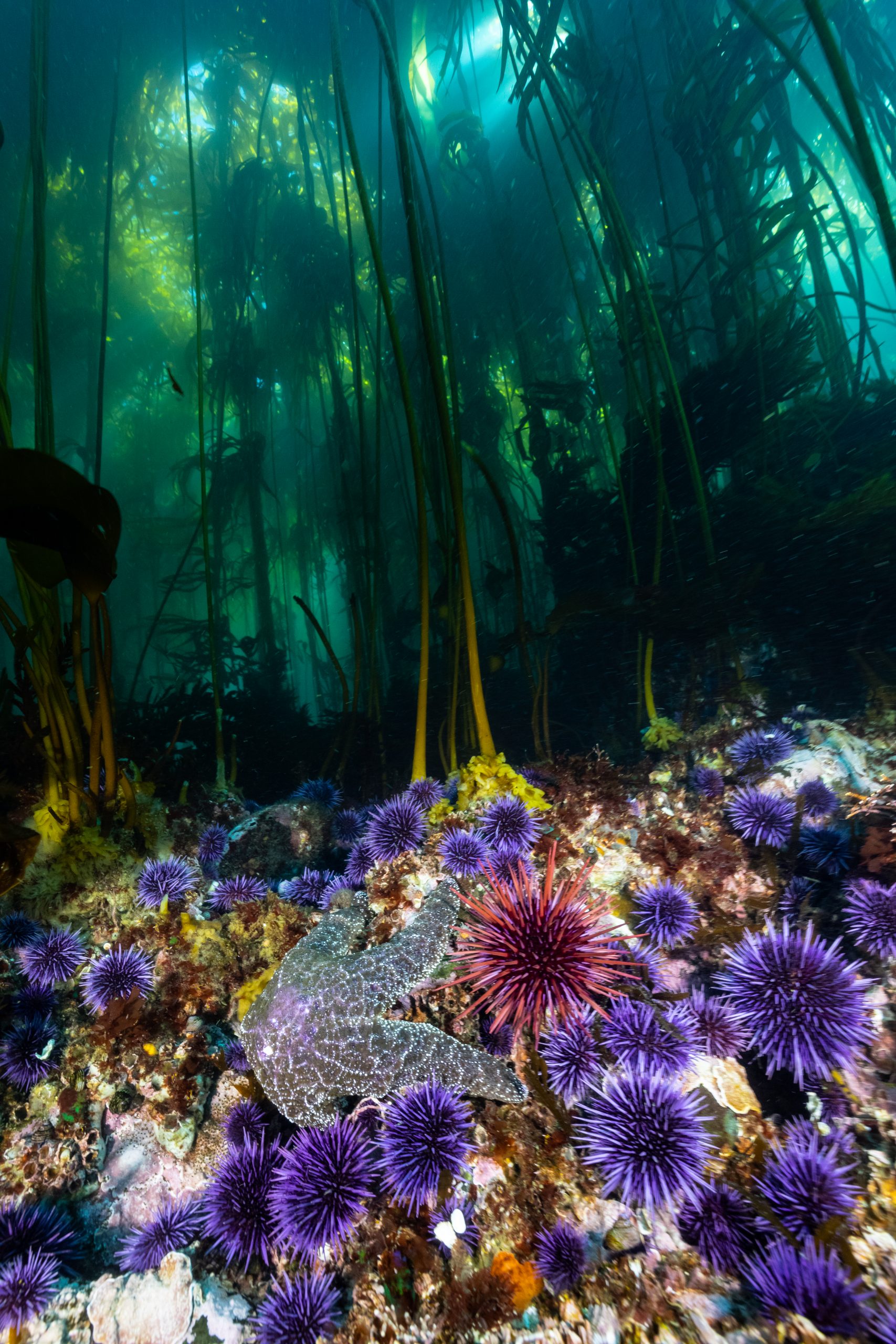Help the Kelp: How Innovative Science and an Unprecedented New Investment Will Inform the Future of Kelp Restoration in California
California’s iconic underwater forests are under threat from climate change. From 2014-2019, more than 95% of the bull kelp off our state’s northern coastline disappeared following a record-breaking marine heat wave and an explosion in kelp-eating purple sea urchin populations. Portions of California’s central and south coasts, such as the Monterey Peninsula, have also experienced severe declines in kelp. These die-offs have had serious impacts on coastal communities – closing fisheries, shuttering dive shops, and affecting tribal members, divers, and fishermen across the state.

In 2021, the California Ocean Protection Council (OPC) released a groundbreaking Kelp Action Plan containing strategies and opportunities to address the kelp crisis proactively. This included the launch of a statewide Kelp Recovery Research Program through which OPC and California Sea Grant, in coordination with the California Department of Fish and Wildlife (CDFW), solicited proposals for “solutions-oriented” projects that would directly inform the efforts of resource managers to protect and restore kelp ecosystems statewide. As of last week, the long-anticipated results of these projects are now publicly available. Some exciting outcomes of these projects include:
- Researchers at UC Santa Barbara and UC Santa Cruz used cutting-edge modeling techniques to develop a scientific framework for determining where and when kelp restoration might have the best chance of success.
- Scientists from Moss Landing Marine Labs developed novel, low-cost, and scalable bull kelp aquaculture methods. These methods will greatly improve the feasibility and success of future bull kelp restoration efforts.
- Researchers at UC Irvine found that some populations of giant kelp are more resistant to heat stress than others. These results will help managers “future-proof” restoration efforts by identifying which kelp populations might survive best in a warming ocean.
- Researchers from CSU Monterey Bay and Reef Check California discovered that intertidal areas are a much more important source of purple sea urchins than previously thought. This finding will help resource managers select more optimal sites for kelp restoration.
- A consortium of scientists from the University of Wisconsin-Milwaukee, UC Santa Cruz, and USC developed a “seed bank” of over 1,700 bull kelp genotypes from 14 sites across the state. This seed bank will help preserve the imperiled species and its genetic diversity for decades into the future.
The Kelp Recovery Research Program has proven invaluable in filling knowledge gaps, but significant scientific, policy, and management questions remain. To address these needs, OPC, California Sea Grant, and CDFW have just announced $5 million in new funding to accelerate and scale up kelp research and restoration across the state. Projects supported through this new funding will directly restore kelp, help resource managers further develop solutions to the kelp crisis, and foster meaningful partnerships with tribes, community-based organizations, and impacted stakeholders.
As is the case with so many impacts of climate change, the kelp crisis can seem overwhelming. But we’re not despairing. California is home to the world’s top kelp scientists, resource managers who deeply care about this issue, and an army of coastal community members – tribes, fishermen, divers, surfers, artists, and others – who are committed to protecting what they love. Doubling down on restoration, research, and community engagement is charting a path to resilience that will protect marine ecosystems and livelihoods into the future.
Request for Proposals – More Information
OPC, California Sea Grant, and CDFW are soliciting proposals for projects that will accelerate and scale up kelp research and restoration in California to address remaining research needs, support action while a statewide Kelp Restoration and Management Plan is being developed by CDFW, and promote a “learn by doing” approach to kelp conservation.
- Informational Webinar (Optional): Tuesday, July 25, 2023 at 1:00 p.m.
- Letter of Intent due to California Sea Grant: Tuesday, August 15, 2023 by 5:00 p.m.
- Full proposals due to California Sea Grant: Tuesday, October 3, 2023 by 5:00 p.m.
Visit the California Sea Grant website for award and submission details, contact information, and more.

